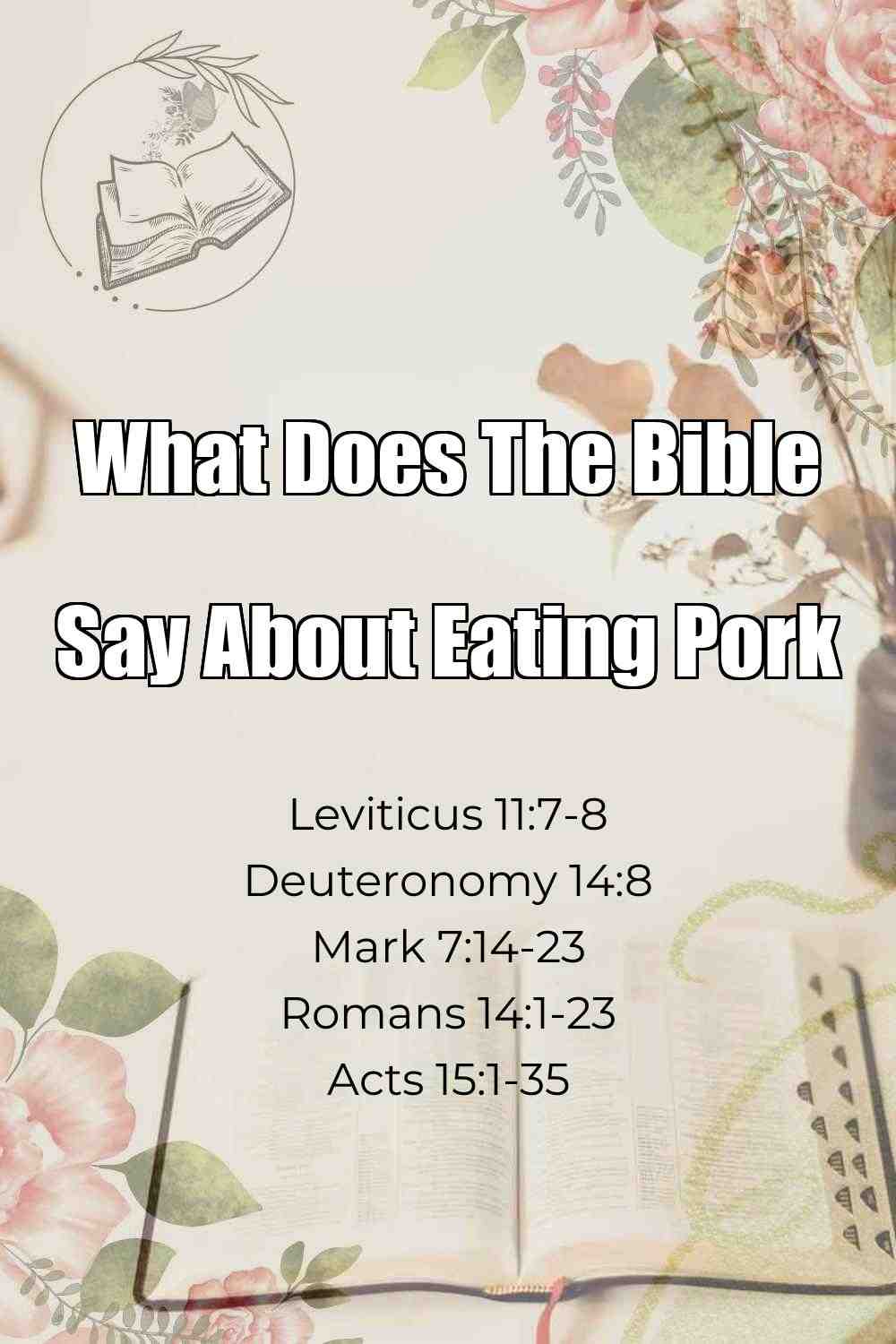Does The Bible Say Not To Eat Pork? The Ultimate Guide To Biblical Dietary Laws
Does the Bible say not to eat pork? This question has sparked debates and curiosity for centuries among religious scholars, health enthusiasts, and curious minds alike. Whether you're exploring the Bible for spiritual guidance or simply curious about dietary rules, this topic dives deep into the heart of ancient teachings. So, buckle up, because we're about to unravel the mysteries behind pork consumption in biblical times!
Now, let’s get real for a second. The Bible is full of rules, guidelines, and wisdom that can sometimes feel overwhelming. Some of these rules are straightforward, while others require a bit of interpretation. One of the most debated topics in the Bible is the prohibition of eating pork. But why does it matter? And what does the Bible really say about it? We’ll break it all down for you in this article.
Whether you’re a devout Christian, a curious seeker, or just someone who loves bacon but wants to understand the context, this article is for you. Stick around, and we’ll dive into the nitty-gritty of biblical teachings on pork consumption, historical perspectives, and what it all means today. Trust me, it’s gonna be a wild ride!
Read also:Wolfs Superior Sandwich Havertown Your Ultimate Sandwich Destination
Why Does the Bible Prohibit Pork?
Let’s start with the basics. The Bible’s stance on pork consumption isn’t random. It’s rooted in the Old Testament, specifically in the Book of Leviticus and Deuteronomy. These books outline dietary laws given to the Israelites by God. But why pork, specifically? The answer lies in the way pigs were perceived in ancient times.
According to Leviticus 11:7-8, God commanded the Israelites not to eat pork because pigs don’t chew the cud, even though they have split hooves. This made them “unclean” in the eyes of the law. In biblical times, cleanliness wasn’t just about hygiene—it was a spiritual concept tied to holiness and separation from the surrounding cultures.
What Makes Pork Unclean?
Now, here’s where things get interesting. The concept of “unclean” in the Bible goes beyond just food hygiene. It’s about maintaining a holy lifestyle and distinguishing the Israelites from other nations. Pigs were seen as impure because of their eating habits and lifestyle. Unlike animals that chew the cud, pigs eat almost anything, including garbage and even carrion. This made them a symbol of impurity in the ancient world.
Plus, let’s not forget the health aspect. In ancient times, without modern refrigeration or cooking techniques, consuming pork could lead to diseases like trichinosis. So, while the prohibition might have started as a spiritual rule, it also had practical health benefits.
Does the New Testament Change the Rules?
Fast forward to the New Testament, and things get a little more complicated. Jesus and the apostles often emphasized the importance of spiritual cleanliness over dietary laws. In Mark 7:18-19, Jesus declared all foods clean, essentially nullifying the Old Testament dietary restrictions. But does this mean Christians are free to eat pork without any guilt? Well, it’s not that simple.
Paul, in his letters, also addressed this issue. In Romans 14:14, he says, “I know and am persuaded by the Lord Jesus that nothing is unclean in itself.” However, he also warns against offending others by eating foods they consider unclean. So, while the New Testament lifts many dietary restrictions, it also emphasizes respect for others’ beliefs and practices.
Read also:The Pink Tea Cup A Trend Thats Brewing Up A Storm
What Do Modern Christians Believe?
In today’s world, Christian beliefs about pork consumption vary widely. Some denominations, like the Seventh-day Adventists, still adhere to the Old Testament dietary laws and avoid pork. Others, like most Protestants and Catholics, don’t see any issue with eating pork, citing Jesus’ words in the New Testament. It all comes down to personal conviction and cultural context.
Interestingly, some Christians argue that while the dietary laws may not apply today, there’s still wisdom in avoiding pork for health reasons. After all, pigs are still scavengers, and their meat can carry diseases if not properly cooked. So, even if you’re not bound by biblical law, there might be practical reasons to think twice about that bacon sandwich.
Historical Context of Pork in the Bible
To truly understand why the Bible prohibits pork, we need to look at the historical context. In ancient Israel, pigs were considered lowly animals, associated with paganism and idol worship. Many surrounding cultures, like the Philistines, worshipped pig deities, which made pigs a symbol of foreign influence and spiritual impurity.
Additionally, pigs were not domesticated in the same way as other livestock. They roamed freely, often scavenging for food in unclean places. This made them less suitable for sacrifice and ritual purposes. In a culture where food was closely tied to spirituality, pigs simply didn’t fit the bill.
How Did Other Cultures View Pork?
Interestingly, the prohibition against pork wasn’t unique to the Israelites. Many ancient cultures, including the Egyptians and Persians, also avoided pork for similar reasons. The Egyptians, for example, associated pigs with the god Set, who was seen as evil and chaotic. This cultural aversion to pork reinforces the idea that the Bible’s dietary laws were influenced by the surrounding environment.
Even today, many cultures and religions, like Islam, prohibit pork consumption. This shows that the concept of pork as “unclean” has deep roots in human history, transcending religious boundaries.
Health Implications of Eating Pork
Let’s talk about the elephant in the room—or should I say, the pig on the plate. Is pork really that bad for you? While modern farming practices have made pork safer to consume, there are still some health concerns to consider. Pigs are natural scavengers, which means they can carry parasites and bacteria that other animals don’t.
- Trichinosis: A parasitic infection caused by eating undercooked pork.
- Tapeworms: Pigs can carry tapeworms, which can infect humans if the meat is not properly cooked.
- High Fat Content: Pork is often high in saturated fats, which can contribute to heart disease if consumed in excess.
That being said, modern pork is much safer than it was in biblical times. With proper cooking and handling, most of these health risks can be minimized. So, while the Bible’s prohibition on pork might have started as a health precaution, today’s pork is generally safe to eat—if you’re okay with it spiritually, that is.
Is Pork Bad for the Environment?
Another angle to consider is the environmental impact of pork production. Industrial farming practices can lead to deforestation, water pollution, and greenhouse gas emissions. While this wasn’t a concern in biblical times, it’s definitely something to think about in today’s world. If you’re concerned about sustainability, you might want to reconsider your pork consumption, regardless of religious beliefs.
Does Science Support the Bible’s Stance on Pork?
Science and religion don’t always see eye to eye, but when it comes to pork, they might actually agree. Studies have shown that pork can carry harmful pathogens if not properly cooked. While modern cooking techniques have made pork safer, there’s still a risk of contamination if proper precautions aren’t taken.
Plus, let’s not forget the nutritional aspect. Pork is often high in saturated fats and calories, which can contribute to obesity and heart disease. While the Bible’s prohibition on pork might have been based on spiritual reasons, there’s no denying the potential health benefits of avoiding it.
What Do Experts Say?
Experts in nutrition and public health often recommend moderation when it comes to pork consumption. While it’s not necessarily “bad” for you, it’s important to be mindful of how it’s prepared and consumed. Some even suggest opting for leaner cuts of pork or choosing plant-based alternatives to reduce health risks.
Does the Bible Say Not to Eat Pork? Final Thoughts
So, does the Bible say not to eat pork? The answer is yes—and no. While the Old Testament clearly prohibits pork consumption, the New Testament offers more flexibility. It’s all about personal conviction and cultural context. Whether you choose to eat pork or not, the important thing is to respect others’ beliefs and make informed choices.
As we’ve seen, the Bible’s prohibition on pork isn’t just about food—it’s about spirituality, health, and cultural identity. While modern science and farming practices have made pork safer to eat, there’s still wisdom in the Bible’s teachings. So, the next time you’re debating whether to indulge in that bacon cheeseburger, take a moment to reflect on the bigger picture.
And hey, if you’re still unsure, why not try some delicious plant-based alternatives? Your body—and maybe even your soul—will thank you for it. So, what do you say? Are you team pork or team no-pork? Let us know in the comments below, and don’t forget to share this article with your friends!
Table of Contents
- Why Does the Bible Prohibit Pork?
- Does the New Testament Change the Rules?
- Historical Context of Pork in the Bible
- Health Implications of Eating Pork
- Does Science Support the Bible’s Stance on Pork?
- Does the Bible Say Not to Eat Pork? Final Thoughts
Subheadings
Article Recommendations


